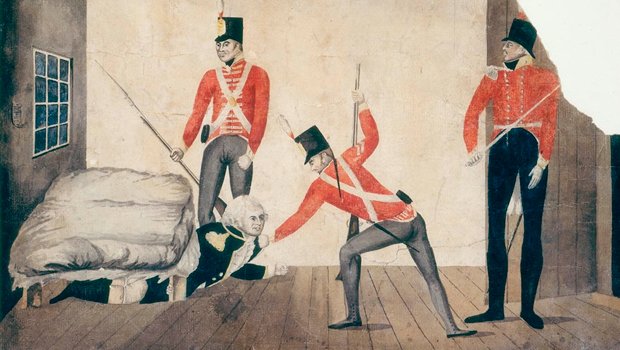On this day: Rum rebellion rocks Sydney

ON 26 JANUARY 1808, 400 men from the New South Wales Corps marched around Sydney Cove towards Government House to arrest the state’s fourth governor, Admiral William Bligh.
Brandishing bayonets and advancing to the tune of ‘The British Grenadiers’, the uniformed officers surrounded the governor’s residence. It took about two hours to find Bligh hiding inside – a political cartoon (above) from the time shows three soldiers dragging him out from under a bed.
“It was highly theatrical,” says Paul Brunton, senior curator at the NSW State Library in Sydney. “You didn’t need all those soldiers to capture the governor, but it was to make a theatrical point that this was a solemn state occasion, much as if it was a funeral or a parade.”
This was the first and only military coup d’état in Australia’s history. The rebellion lasted until 1810, when Governor Lachlan Macquarie arrived, established the rule of law, and repealed any changes made by the military administration.
A clash of powerful interests
Bligh had been appointed in 1806 to lick the colony into shape and reign in the powerful NSW Corps. He started by shutting down the rum trade, taking back land for public use, and listening to the concerns of poorer settlers.
Individuals like Major George Johnston, who led the NSW Corps, and the wealthy entrepreneur John Macarthur, soon felt threatened by Bligh’s moves to assert his authority. “The NSW Corps had enriched themselves very well and had become very good capitalists,” says Paul. “There was a lot of wealth to be protected, and they just saw Bligh as an interloper.”
“There would have to be a time when it had to be asserted that the NSW Corps could not continue running things the way they wanted to do it.”
Rising tensions and repeated clashes between Bligh and the military elite prompted Johnston to propose an armed takeover – today known as the Rum Rebellion. Paul says in reality rum had little to do with it. Some officers made money in the rum trade, but Bligh’s treatment of property rights and prime real estate was much more concerning to them. “It wasn’t called the Rum Rebellion until 50 years later,” he says.
The aftermath of the coup
When the rebellion ended after almost two years, the NSW Corps was disbanded, Johnston was cashiered and Macarthur was forced to leave the colony.
“It broke once and for all the power of the NSW Corps, and made the governor much more powerful,” says Paul. “It established the rule of law so that we would have no more revolutions against authority.”
He says although Bligh’s heavy-fisted approach failed to control the colony, it did lead to the installation of Governor Macquarie, who instigated many reforms, and played a part in the transformation of NSW from penal colony to free society.
RELATED STORIES

